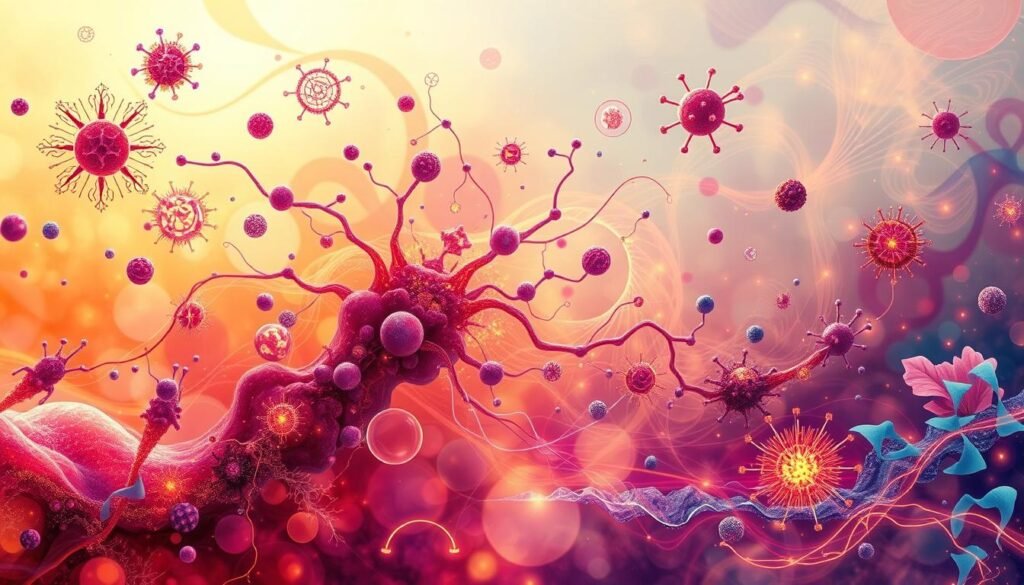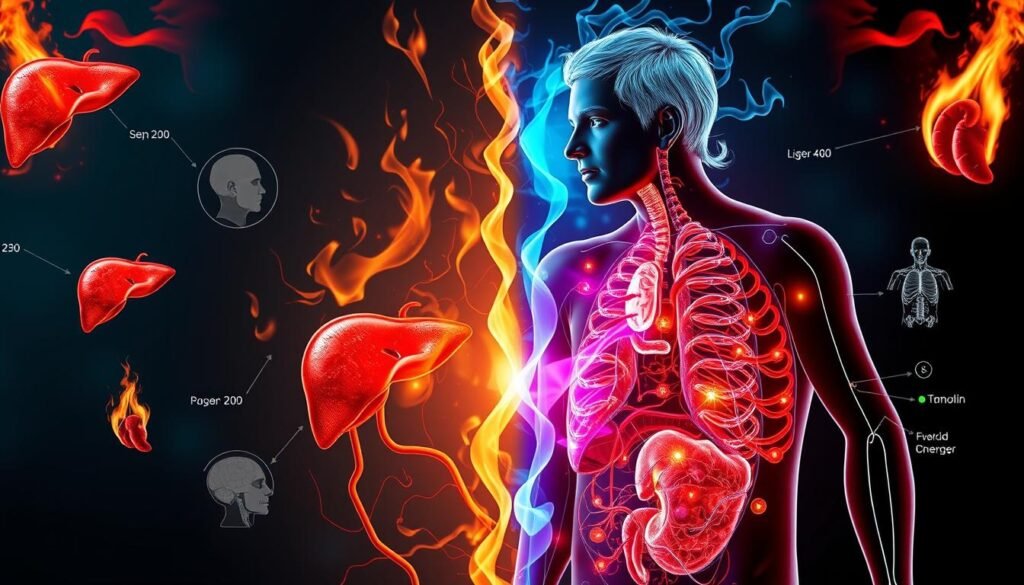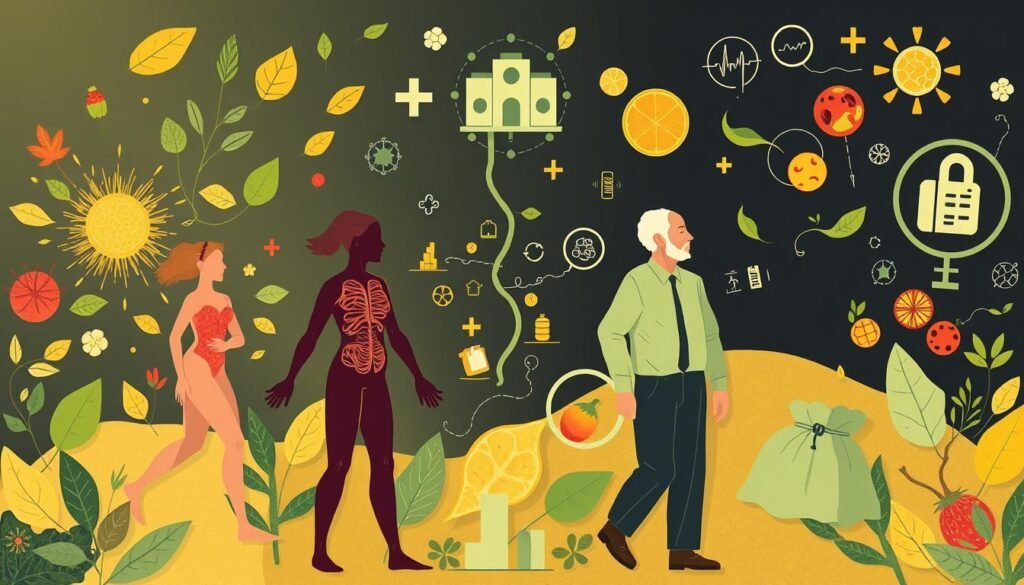The Ultimate Guide to Boosting Metabolism After 40
Did you know that by age 40, you need to eat 100 calories less each day to keep your weight the same? This is because your resting metabolic rate naturally goes down with age. As we get older, our metabolism and aging process are closely tied, making it harder to keep a healthy weight. This article will guide you on how to Boost your Metabolism After 40, covering the factors that affect metabolism and aging, and giving you strategies to increase it.

It’s key to understand the connection between age and metabolism to make an effective plan. Because metabolism and aging are connected, it’s important to think about how aging affects metabolism when trying to Boost it.
==> Watch the Purple Peel Exploit Now And Turbocharge Your Calorie Burn
Key Takeaways
- Metabolism slows down with age, affecting age and metabolism.
- Eating 100 calories less per day at age 40 can help maintain weight due to the decline in resting metabolic rate.
- Metabolism and aging are closely linked, making it essential to consider both when developing a plan to Boost Metabolism.
- Factors such as genetics, muscle mass, and hydration play a role in metabolic health and metabolism.
- Strategies like High-intensity interval training (HIIT) and incorporating protein into your diet can help increase metabolism.
- Understanding the relationship between metabolism and aging is key to developing an effective plan to Boost Metabolism.
Understanding Metabolism and Its Importance
Metabolism is key to our health and well-being. It turns food into energy, which our body needs for breathing, moving, and fixing cells. As we get older, our metabolism slows down, impacting our health.
Age, sex, body type, genes, hormones, and how active we are all affect metabolism. Knowing this helps us find Ways to boost it. For example, eating more protein helps grow muscle and speeds up metabolism.

- Age: Metabolism slows down with age
- Body composition: Muscle mass significantly impacts basal metabolic rate (BMR)
- Genetics: Genetic factors can influence metabolism
- Hormone levels: Hormonal changes can affect metabolism
- Activity level: Regular exercise can help boost metabolism
Understanding what affects metabolism helps us improve our health. Eating well, exercising, and sleeping enough are key. These changes can help us stay healthy and active as we age.
The Impact of Age on Metabolism
As we get older, our bodies change in many ways. One key change is how our metabolism slows down. This slowdown can cause weight gain and other health problems. It’s important to know how metabolism changes with age to stay healthy.
Studies show that metabolism starts to drop after age 60. It goes down by about 0.7 percent each year. By the 90s, calorie needs can be 26% lower than in midlife. Hormonal changes, less muscle, and different eating habits all play a role in this decline.

How Metabolism Changes Over Time
Several factors affect how metabolism changes with age. These include:
- Less muscle mass: Muscle burns more calories than fat, affecting metabolism.
- Hormonal changes: Lower levels of testosterone and estrogen lead to less muscle with age.
- Changes in eating habits: Eating alone, cooking issues, less appetite, or less access to healthy food can also impact metabolism.
Common Myths about Aging and Metabolism
Even though metabolism slows with age, there are Ways to boost it. Knowing how metabolism changes and adopting healthy habits can help. Regular exercise and a balanced diet are key to fighting the effects of aging on metabolism.
Nutrition’s Role in Metabolism
As we get older, our metabolism slowing down with age can cause weight gain and health problems. But, eating a balanced diet can help keep us healthy and boost our Metabolism After 40. It’s important to eat foods rich in protein, fiber, and healthy fats to support metabolism and getting older.
Eating whole foods like lean proteins, whole grains, and fruits and vegetables can increase metabolism. Drinking plenty of water is also key for metabolism, as it helps our body work its best. Here are some nutrients that help support metabolism:
- Protein: helps build and repair muscle tissue
- Fiber: helps regulate blood sugar levels and promote feelings of fullness
- Healthy fats: helps support heart health and satisfy hunger

By eating nutrient-rich Foods and staying hydrated, we can support our metabolism and health, even as our metabolism slowing down with age. A balanced diet, along with regular exercise, can help us stay at a healthy weight. This reduces the risk of chronic diseases and supports overall metabolism and getting older.
| Nutrient | Food Sources | Benefits for Metabolism |
|---|---|---|
| Protein | Lean meats, fish, eggs, legumes | Helps build and repair muscle tissue |
| Fiber | Whole grains, fruits, vegetables | Helps regulate blood sugar levels and promote feelings of fullness |
| Healthy Fats | Nuts, seeds, avocados | Helps support heart health and satisfy hunger |
Exercise and Metabolism After 40
As we get older, our metabolism slows down. This makes it harder to keep a healthy weight. Regular exercise is key to fight this slowdown. It boosts our metabolism and improves our health.
Exercise is very important after 40. It helps build muscle, which is good for our metabolism. Research shows that muscle mass decreases with age, more so in men than women. This loss affects our metabolism, making it harder to stay healthy.
Benefits of Exercise for Metabolism
- Helps build muscle mass, which is essential for a healthy metabolism
- Boosts metabolic rate, making it easier to maintain a healthy weight
- Improves overall health and increases energy levels
Good workouts for boosting metabolism include strength training, HIIT, and cardio. These exercises improve heart health, increase muscle, and boost metabolism. Regular exercise helps us fight age-related metabolism changes and keeps us at a healthy weight.

| Age | Metabolic Rate | Muscle Mass |
|---|---|---|
| 30-40 | Decreases by 5% | Loss of 5-10 pounds |
| 40-50 | Decreases by 10% | Loss of 10-15 pounds |
| 50-60 | Decreases by 15% | Loss of 15-20 pounds |
The Role of Muscle Mass in Metabolism
As we get older, our muscle mass goes down. This can slow down our metabolism and affect our health. It’s important to understand how muscle mass and metabolism are connected.
Studies show that muscle is more active than fat when it comes to burning calories. People with more muscle find it easier to lose weight. To build muscle after 40, focus on strength training, eat enough protein, and rest well.
Here are some tips for increasing muscle mass after 40:
- Engage in Regular strength training to build and keep muscle.
- Eat a balanced diet with enough protein to help muscles grow and repair.
- Make sure to get enough rest and recovery time for muscles to rebuild and grow.

By following these tips, we can support our metabolism and health as we age. This can help prevent age-related diseases and improve our quality of life. Always talk to a healthcare professional before starting any new exercise or diet program, even more so if you have health conditions.
| Age Group | Muscle Mass Loss |
|---|---|
| 30-40 years | 10-20% |
| 40-50 years | 20-30% |
| 50-60 years | 30-40% |
Hormones and Their Effect on Metabolism
As we get older, our bodies change in many ways. One big change is how our hormones work. This affects how we use energy. Knowing about these changes helps us find ways to boost our metabolism.
Many hormones are important for metabolism. Insulin helps cells use blood sugar and store fat. Cortisol can make us hungry and store more fat. Leptin tells us when we’re full, but if it’s not working right, we might eat too much. Ghrelin makes us hungry, with levels going up before meals and down after.
Thyroid hormones control how fast we burn energy, and imbalances can change our weight. Testosterone helps build muscle and burn fat, affecting our weight. As we age, these hormone levels can drop, changing how we metabolize.
To deal with hormonal changes and support our metabolism, we need to make lifestyle changes. Exercise and eating fewer calories can help. Knowing how hormones affect our metabolism and aging helps us make better health choices. This way, we can find ways to boost our metabolic rate.

The following table summarizes the effects of various hormones on metabolism:
| Hormone | Effect on Metabolism |
|---|---|
| Insulin | Helps cells absorb blood sugar and store fat |
| Cortisol | Affects metabolism by increasing cravings and promoting fat storage |
| Leptin | Signals satiety, but leptin resistance may result in overeating |
| Ghrelin | Stimulates hunger, with levels peaking before meals and decreasing after eating |
| Thyroid hormones | Regulate metabolic rate, with imbalances causing weight changes |
| Testosterone | Influences muscle mass production and fat metabolism, impacting weight composition |
Understanding how hormones and metabolism are connected helps us take care of our health as we age. It’s a way to support our overall well-being.
Stress and Metabolism: The Connection
As we age, our bodies change in many ways. Stress is one factor that often gets overlooked. It can make us eat more, which can slow down our metabolism and affect how we age.
Studies show that stress can really impact our bodies, more so as we get older. For instance, chronic stress can make us hungrier and eat more. This can be a big problem as we age, leading to health issues like a slower metabolism and aging process.
How Stress Affects Your Body’s Metabolism
Stress makes our bodies release hormones like cortisol. These hormones can make us hungrier and gain weight, often around the midsection. This is a big concern as we age, as it raises our risk of age-related diseases.
Techniques for Managing Stress
But there’s good news. There are ways to manage stress and help our metabolism and aging process. Meditation, yoga, and deep breathing exercises are great options. Adding these to our daily routine can lower our stress levels and improve our health and well-being.

Sleep’s Impact on Metabolism
Sleep is key to keeping our metabolism, hunger, and appetite in check. As we get older, our sleep habits often change. This can impact our metabolism and how we age. Studies show that not getting enough sleep or having sleep disorders can mess with our body’s metabolism.
A study found that not sleeping enough can lower our metabolic rate by 15%. This can harm our health, even more so as we age. Also, not sleeping well can mess with our body’s metabolic and endocrine functions. This increases the chance of getting diseases like diabetes.

To better sleep and support our metabolism, we need to make a bedtime routine. We should avoid caffeine and electronics before bed. Also, making our sleep space comfortable is important. By focusing on sleep, we can keep our metabolism in check and lower the risk of health problems as we age.
Here are some ways to improve your sleep:
- Stick to a regular sleep schedule
- Stay away from stimulating activities before bed
- Make your sleep area relaxing
By following these tips, we can sleep better, support our metabolism, and lower the risk of health issues as we age.
Metabolic Disorders to Watch Out For
As we age, our metabolism and aging process can change due to many factors. These include genetic defects, lifestyle choices, and environmental pollutants. Metabolic disorders can harm our health, raising the risk of diabetes, heart disease, and obesity.
Genetic defects, being overweight, and a sedentary lifestyle are common causes. Some ethnic groups, like Hispanics, face a higher risk of metabolic syndrome. Signs of metabolic slowdown include weight gain, fatigue, and less energy.
If you notice these symptoms, see a healthcare professional. They can help you boost your age and metabolism and health. This might involve exercise, a balanced diet, and Quitting Smoking.

By managing your metabolic health, you can lower the risk of chronic diseases. It’s never too late to make a positive change. Start now for a healthier, happier life.
| Metabolic Disorder | Description |
|---|---|
| Metabolic Syndrome | A cluster of conditions that increase the risk of developing type 2 diabetes and cardiovascular disease |
| Diabetes | A condition characterized by high blood sugar levels, which can lead to serious health complications if left untreated |
| Obesity | A condition characterized by excess body fat, which can increase the risk of developing chronic diseases |
Building a Sustainable Metabolic Boosting Plan
Improving your metabolism is a long-term journey, not a quick fix. It involves making lasting lifestyle changes. By Setting achievable goals and tracking your progress, you can make small but significant changes. These changes can help you maintain a faster metabolism, even as you get older.
Setting Realistic Goals
Don’t aim for huge, unrealistic changes. Instead, focus on small, achievable steps. This could mean eating more protein, doing more strength training, or taking a short walk after meals. Every small change helps when it comes to boosting your metabolism.
Tracking Progress and Making Adjustments
Keep an eye on how you’re doing, whether it’s through body measurements, energy levels, or health changes. Be ready to adjust your plan as your body responds differently over time. Celebrate each small win, and don’t get down on yourself for setbacks. They’re just part of the journey.
The Importance of Consistency
The secret to a lasting metabolic boost is making healthy habits a part of your daily life. By focusing on your metabolism and aging, you’ll not only manage your weight better. You’ll also have more energy, sleep better, and feel more alive. Keep at it, and you’ll be on your way to a healthier, more vibrant life.
FAQ
What is metabolism, and why is it important?
Metabolism is how our body turns food into energy. It’s key for things like breathing, moving, and fixing cells.
How does age affect metabolism?
As we get older, our metabolism slows down. This makes it harder to keep a healthy weight. By age 40, we need to eat 100 calories less daily to stay the same weight.
What are some common myths about aging and metabolism?
Many think metabolism drops a lot with age and there’s nothing we can do. But, age does slow it down, but we can boost it and stay healthy.
What role does nutrition play in boosting metabolism?
Nutrition is vital for metabolism. Eating a balanced diet with protein, fiber, and healthy fats helps. Foods like lean proteins, whole grains, and fruits and veggies are good. Drinking enough water is also key.
What types of exercise are best for boosting metabolism after 40?
Good workouts include strength training, HIIT, and cardio. Strength training builds muscle, which boosts metabolism. Cardio improves heart health and metabolism too.
How does muscle mass affect metabolism?
Muscle mass is important for metabolism. As we age, we lose muscle, slowing metabolism. More muscle means a faster metabolism and better health.
How do hormonal changes affect metabolism as we age?
Hormonal shifts can slow metabolism after 40. Managing these changes can improve metabolism and health. Hormones affect muscle, which is key for metabolism.
How does stress impact metabolism?
Stress can make us eat more, slowing metabolism. Stress management, like meditation and yoga, supports metabolism and health.
What is the connection between sleep and metabolism?
Sleep impacts the system that controls hunger and metabolism. Better sleep, through routines and a good sleep space, supports metabolism and health.
What are some signs of metabolic slowdown, and when should I consult a healthcare professional?
Signs include weight gain, fatigue, and low energy. If you notice these, see a doctor. They can help boost metabolism and improve health.
